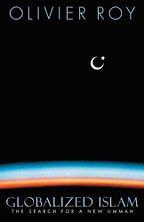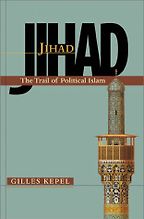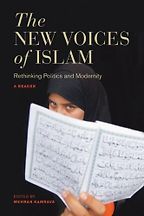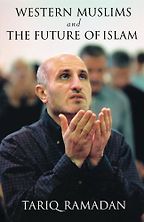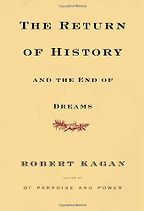Why Islam and Modernity?
Islam and Modernity are two of the most contested academic and political concepts around. No serious thinkers today talk about a single ‘Islam’, speaking instead in terms of multiple ‘Islams’. And the same goes for definitions of ‘modernity’. Scholars would throw the debate out immediately on those grounds, but I think the problem remains. Precisely because the debate is so contested, it has been hijacked by the hyper-simplistic fringes: on the one side the essentialist Right that sees Islam as retrograde, barbaric, medieval, monolithic, and on the other the bomb-dropping lunatics of the extreme Islamic periphery who actively pitch the debate in those oppositional terms: Islam against Modernity.
Five Books interviews are expensive to produce. If you're enjoying this interview, please support us by donating a small amount.
I’m fascinated by the question of how Islam exists in the modern world. Academically this has been a lively space for many years now, moving through many different schools of thought. The Orientalist idea of Islam as something different from modernity was widely accepted until the 1960s and 70s when we see a shift, with the work of Edward Said and others, away from this sense of the Arab as ‘the other’ and away from old-fashioned paternalistic ways of looking at the East and the Arab. The last decade has been particularly dramatic, of course, with Islam being cast, post 9/11, as the Manichean opposite of everything that the West stands for and with the discussion becoming highly polemical and politicised. And now we are moving on from this and entering a new, really interesting, stage, as some really great modernist Islamic thinkers begin to reframe the terms of the debate.
Tell me about your first book, Olivier Roy’s Globalized Islam: The Search for a New Umma.
I think this is one of the best starting points to try to figure out what happened to Islam, or these multiple Islams if you like, over the past century. Olivier Roy is a heavyweight French academic with huge PhD teams feeding into his work. He tries to explain how Islam’s position has shifted over the last 100 years. Roy describes a world in which Islam was highly local and highly social, fulfilling all the traditional roles of religion, from rites of passage and healing to feeding aspirations and breeding community. What he describes is a space in which there are multitude of Islams profoundly tied into the social fabric in which they work. He gives wonderful sociological examples from the Marabout in Morocco with his version of Moroccan Islam with ultra-local customs, adapted to the people, language, terrain and political circumstances, through to Imams in Indonesia with their highly localised, ingrained and sensitive versions of community Islam, passing through Egypt, Lebanon, Turkey, Central Asia and so on.
Roy then charts the gradual politicisation of Islam into more regional movements, impacted by greater communication methods, through to more political versions in the 1930s-50s, and then on to the phenomenon of Saudi-funded Wahhabi Islam. This Wahhabism was anathema and culturally alien to other parts of the Islamic world but with huge amounts of funding and politicisation of these ideas, Roy explains how what emerged was a new kind of religion as political ideology as opposed to culturally specific social religion. He does a fantastic job of showing the way Islam shifted from a social use to an ideological position over a period of 100 years.
And we see more about this politicisation of Islam in your next book, Jihad: The Trail of Political Islam.
Gilles Kepel is another brilliant French academic who again demonstrates the excellent sociological work of the French in this area. The idea behind this book was to explain where and how the ideas of Jihad originated. Kepel deals with a shorter sweep of history than Roy but gives an excellent overview of the movements that created political Islam. He is particularly interesting from late 1970s onwards when the Iranian revolution brought its own version of Shiite political Islam into public consciousness and accelerated other political Islamic movements elsewhere. Increasingly, since the 1950s, middle-class Arabs, from Egypt and Syria to the Gulf and North Africa, had sought a return to a more conservative form of Islam in which religion would play a more important role in society. In the 1980s and 90s, a breakaway fringe of hardcore ideological political Islamists, stirred up by the Iranian revolution, became much more activist, opting for violence in certain cases. But, in reality, this ended up alienating vast numbers of social political Islamists with their desire for a return to traditional values. Kepel actually suggests that the 9/11 attack on the twin towers can be seen almost as the end of the true ‘political’ movement in Islam.
Get the weekly Five Books newsletter
For me, Roy and Kepel are so useful precisely because they talk sociology and history rather than religion or values.
Tell us about The New Voices of Islam. What has happened to Islamic thought in the aftermath of 9/11?
It’s hard to talk about this without generalising but I think we see Islam becoming more popular and social and less political. There’s also been a great deal of really sophisticated new thinking about how Islam fits in the post-9/11 world. The New Voices of Islam by Mehran Kamrava is a useful anthology of the new-reform Muslim thinkers who have extremely interesting and open ideas about where Islam is moving. Many are also active theologians trying to push Islam in certain directions. From Mohammed Arkoun, the Algerian living in France, to AbdelKarim Soroush, the Iranian theologian, to Leila Ahmed and Amina Wadud who do fascinating theological work on place of women in Islam, this book is a window on to the enormous amount of muted but highly sophisticated theological exegesis taking place, often in non-Muslim majority countries where it is sometimes easier for radical Islamic thinkers to work undisturbed.
Your next book, Western Muslims and the Future of Islam, is by one such thinker.
Yes, the lead thinker in Europe in terms of where Islam is going is Tariq Ramadan. He’s a brilliant and controversial academic and philosopher who lectures worldwide and has been banned in the certain places including the US. He’s also the grandson of Hassan al-Banna, founder of Muslim Brotherhood, the first great socio-political movement campaigning to give Islam a central role in the forcefully secular state of Egypt, who was assassinated in 1949. In Western Muslims and the Future of Islam or To be a European Muslim, Ramadan speaks to a fascinating demographic – the European Muslim. He has opened up thinking about Islam and its place in modernity and in the West and has tried to haul the Umma-centric view of what Islam should be into something more universal. He believes that if Islam truly does claim to represent the universal truth then there is no way that it can exclude other cultures from participating in that truth. He has thrown down the gauntlet to Muslims, suggesting that Islam must be able to include more than just the strict highly legalistic normative values of the 7th and 8th centuries into its version of what the world and God and truth is, and he has also got up a whole bunch of Western people’s noses because what he is saying is that all the ideas and cultural norms of the West can be subsumable within the ultimate truth of Islam. This idea and the thought of an Arab reconquista of Europe clearly upsets a lot of people. Ramadan is fascinating for walking this tightrope, as well as being a very interesting representative of the new kind of thinking about Islam and modernity that has been emerging from Muslim thinkers.
And so on to your final book, Robert Kagan’s The Return of History and the End of Dreams.
I threw this in not because I agree with it, but because it’s a book that represents the different terms in which the West is now beginning to think about the 21st century’s big themes. And what a relief: no more Islam vs Modernity, far less ‘evil Muslims’, a real quietening of the cultural discourse that invented these fake ideas of a monolithic ‘West’ or ‘East’ or ‘Islam’ or ‘Modernity’. Kagan is a neo-Con thinker who was close to the Bush administration and is married to an ex-ambassador to NATO. His first book, Of Paradise and Power, was about the intellectual dishonesty of Europe’s Lockean pacifism (guaranteed, as Kagan sees it, by America’s Hobbesian engagement with the real world). The Return of History is a double rejoinder to Samuel Huntington’s book The Clash of Civilizations that saw the 20th century as being made up of battles drawn along cultural lines and to Francis Fukuyama’s The End of History and the Last Man. Kagan, contrary to Huntingdon’s civilisational approach and Fukuyama’s wrong-headed optimism about a post-ideological world, sees the battle-lines of the 21st century drawn between highly successful autocracies and highly ineffective democracies. The relief is that finally it told me that this whole obsession that pitted Islam against modernity and wanted to see Islam as the Manichean double, as the opposite of the West, has flown. That idea is no longer as powerful as it was. It is a sign that the debate has moved on – perhaps we should also thank the recession. We now have more pressing problems to think about.
Five Books aims to keep its book recommendations and interviews up to date. If you are the interviewee and would like to update your choice of books (or even just what you say about them) please email us at [email protected]
